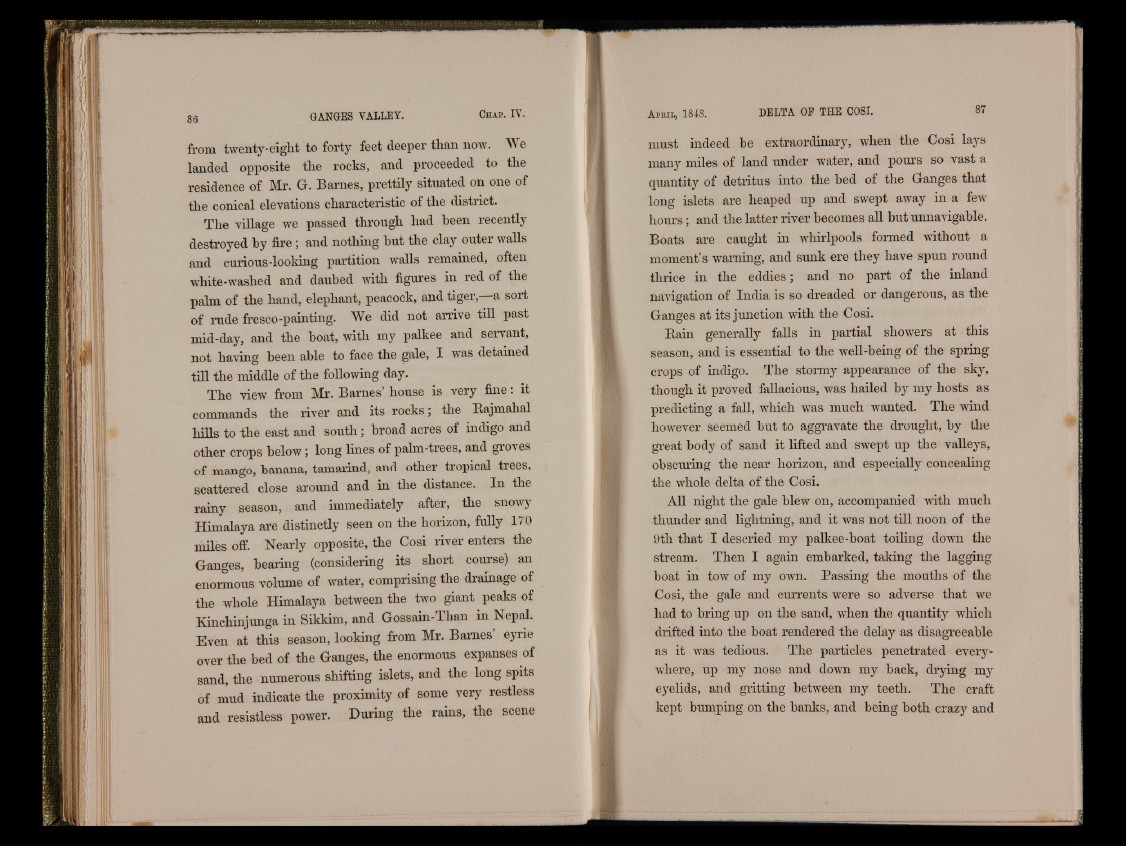
from twenty-eight to forty feet deeper than now. We
landed opposite the rocks, and proceeded to the
residence of Mr. G. Barnes, prettily situated on one of
the conical elevations characteristic of the district.
The village we passed through had been recently
destroyed by fire; and nothing hut the clay outer walls
and curious-looking partition walls remained, often
white-washed and daubed with figures in red of the
palm of the hand, elephant, peacock, and tiger, a sort
of rude fresco-painting. We did not arrive till past
mid-day, and the boat, with my palkee and servant,
not having been able to face the gale, I was detained
till the middle of the following day.
The view from Mr. Barnes’ house is very fine: it
commands the river and its rocks; the Rajmahal
bills to the east and south; broad acres of indigo and
other crops below; long lines of palm-trees, and groves
of mango, banana, tamarind, and other tropical trees,
scattered close around and in the distance. In the
rainy season, and immediately after, the snowy
Himalaya are distinctly seen on the horizon, fully 170
miles off. Nearly opposite, the Cosi river enters the
Ganges, hearing (considering its short course) an
enormous volume of water, comprising the drainage of
the whole Himalaya between the two giant peaks of
Kinchinjunga in Sikkim, and Gossain-Than in Nepal.
Even at this season, looking from Mr. Barnes’ eyrie
over the bed of the Ganges, the enormous expanses of
sand, the numerous shifting islets, and the long spits
of mud indicate the proximity of some very restless
and resistless power. During the rains, the scene
must indeed be extraordinary, when the Cosi lays
many miles of land under water, and pours so vast a
quantity of detritus into the bed of the Ganges that
long islets are heaped up and swept away in a few
hours; and the latter river becomes all hut unnavigahle.
Boats are caught in whirlpools formed without a
moment’s warning, and sunk ere they have spun round
thrice in the eddies; and no part of the inland
navigation of India is so dreaded or dangerous, as the
Ganges at its junction with the Cosi.
Bain generally falls in partial showers at this
season, and is essential to the well-being of the spring
crops of indigo. The stormy appearance of the sky,
though it proved fallacious, was hailed by my hosts as
predicting a fall, which was much wanted. The wind
however seemed but to aggravate the drought, by the
great body of sand it lifted and swept up the valleys,
obscuring the near horizon, and especially concealing
the whole delta of the Cosi.
All night the gale blew on, accompanied with much
thunder and Hghtning, and it was not till noon of the
9th that I descried my palkee-boat toiling down the
stream. Then I again embarked, taking the lagging
boat in tow of my own. Passing the mouths of the
Cosi, the gale and currents were so adverse that we
had to bring up on the sand, when the quantity which
drifted into tire boat rendered the delay as disagreeable
as it was tedious. The particles penetrated everywhere,
up my nose and down my back, drying my
eyelids, and gritting between my teeth. The craft
kept bumping on the banks, and being both crazy and